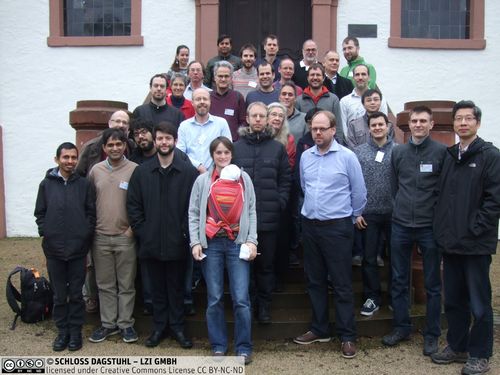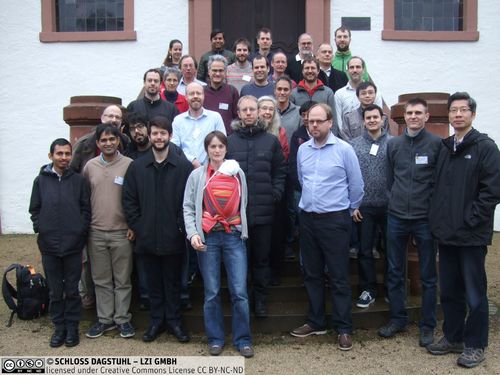Dagstuhl Seminar 16011
Evolution and Computing
( Jan 04 – Jan 08, 2016 )
Permalink
Organizers
- Nick Barton (IST Austria - Klosterneuburg, AT)
- Bernard Chazelle (Princeton University, US)
- Per Kristian Lehre (University of Nottingham, GB)
- Nisheeth K. Vishnoi (EPFL Lausanne, CH)
Contact
- Andreas Dolzmann (for scientific matters)
- Dagmar Glaser (for administrative matters)
Impacts
- Escaping Local Optima using Crossover with Emergent or Reinforced Diversity - Dang, Duc-Cuong; Friedrich, Tobias; Kötzing, Timo; Krejca, Martin S.; Lehre, Per Kristian; Sutton, Andrew M.; Sudholt, Dirk; Oliveto, Pietro S. - Cornell University : arXiv.org, 2016. - 37 pp..
- Update Strength in EDAs and ACO : How to Avoid Genetic Drift : article : 32 pp. - Sudholt, Dirk; Witt, Carsten - Cornell University : arXiv.org, 2016.
Biological evolution has produced an extraordinary diversity of organisms, even the simplest of which is highly adapted, with multiple complex structures. Dynamic structures at even higher levels emerge from collective and social behaviour. These phenomena have traditionally been studied in population genetics, ecology and related disciplines.
However, theoretical computer scientists, endowed with a wide variety of tools, have recently made progress in describing and characterising the computational capabilities of evolution, analyzing natural algorithms, obtaining quantitative bounds for evolutionary models and understanding the role of sex in evolution. The field of evolutionary computation has found that many innovative solutions to optimisation and design problems can be achieved by simulating living processes, such as evolution via random variation and selection, or social behaviour in insects. Researchers in evolutionary computation have recently started applying techniques from theoretical computer science to analyze the optimization time of natural algorithms.
While many connections and results spawned, much remains to be done. The goal of this seminar is to bring together this interdisciplinary group of researchers to further the connections and consolidate this burgeoning new discipline. Some of the general themes/questions that would be discussed are:
- Could computational complexity and/or learning theory explain fundamental questions regarding the emergence of complexity in evolution and the origins of life?
- Could we explain the efficacy of some of the algorithms found in nature and/or be inspired by such algorithms to design novel algorithms for classical problems?
- Could we understand phase transitions and mixing times for important models of evolution/population genetics rigorously?
- Could various dynamics in evolutionary biology (such as sexual evolution) be viewed as an optimization process and their equilibria studied from the lens of game theory?
Following the Dagstuhl tradition, the format of the seminar is intentionally loose. We propose to schedule a plenary session on the first day with introductory talks on the topics above followed by discussions, and identification of promising directions. The remaining of the seminar will consist of breakout sessions giving time for smaller groups to discuss specific problems in depth. The seminar will be concluded with a plenary wrap up session.
Biological evolution has produced an extraordinary diversity of organisms, even the simplest of which is highly adapted, with multiple complex structures. Dynamic structures at even higher levels emerge from collective and social behaviour. These phenomena have traditionally been studied in population genetics, ecology and related disciplines.
However, theoretical computer scientists, endowed with a wide variety of tools, have recently made progress in describing and characterising the computational capabilities of evolution, analyzing natural algorithms, obtaining quantitative bounds for evolutionary models and understanding the role of sex in evolution. The field of evolutionary computation has found that many innovative solutions to optimisation and design problems can be achieved by simulating living processes, such as evolution via random variation and selection, or social behaviour in insects. Researchers in evolutionary computation have recently started applying techniques from theoretical computer science to analyze the optimization time of natural algorithms.
To further the connections and consolidate this burgeoning new discipline, this Dagstuhl seminar brought together participants from the population genetics, mathematical biology, theoretical computer science, and evolutionary computation communities. The seminar opened with a round of introductions, followed by five introductory talks presenting the perspectives of the disciplines attending. Benjamin Doerr introduced runtime analysis of evolutionary algorithms, Paul Valiant discussed evolution from the perspective of learning, Joachim Krug and Nick Barton introduced population genetics, and Nisheeth Vishnoi discussed evolutionary processes from the perspective of theoretical computer science. In addition to talks contributed by participants, there were several breakout sessions on topics identified during the seminar.
The organisers would like to thank the Dagstuhl team and all the participants for making the seminar a success.
 Nick Barton and Per Kristian Lehre and Nisheeth K. Vishnoi
Nick Barton and Per Kristian Lehre and Nisheeth K. Vishnoi
- Ellen Baake (Universität Bielefeld, DE)
- Nick Barton (IST Austria - Klosterneuburg, AT) [dblp]
- Arnab Bhattacharyya (Indian Institute of Science - Bangalore, IN) [dblp]
- Erick Chastain (Rutgers University - Piscataway, US) [dblp]
- Duc-Cuong Dang (University of Nottingham, GB) [dblp]
- Harold P. de Vladar (Parmenides Center for the Study of Thinking, DE)
- Benjamin Doerr (Ecole Polytechnique - Palaiseau, FR) [dblp]
- Carola Doerr (UPMC - Paris, FR) [dblp]
- Tobias Friedrich (Hasso-Plattner-Institut - Potsdam, DE) [dblp]
- Paulien Hogeweg (Utrecht University, NL) [dblp]
- Kavita Jain (JNCASR - Bangalore, IN) [dblp]
- Timo Kötzing (Hasso-Plattner-Institut - Potsdam, DE) [dblp]
- Joachim Krug (Universität Köln, DE) [dblp]
- Per Kristian Lehre (University of Nottingham, GB) [dblp]
- Adi Livnat (University of Haifa, IL) [dblp]
- Kurt Mehlhorn (MPI für Informatik - Saarbrücken, DE) [dblp]
- Tiago Paixao (IST Austria - Klosterneuburg, AT) [dblp]
- Ioannis Panageas (Georgia Institute of Technology - Atlanta, US) [dblp]
- Jorge Perez Heredia (University of Sheffield, GB) [dblp]
- Georgios Piliouras (Singapore University of Technology and Design, SG) [dblp]
- Adam Prugel-Bennett (University of Southampton, GB) [dblp]
- Jonathan L. Shapiro (University of Manchester, GB) [dblp]
- Piyush Srivastava (California Institute of Technology - Pasadena, US) [dblp]
- Damian Mateusz Straszak (EPFL Lausanne, CH) [dblp]
- Dirk Sudholt (University of Sheffield, GB) [dblp]
- Andrew M. Sutton (Hasso-Plattner-Institut - Potsdam, DE) [dblp]
- Barbora Trubenova (IST Austria - Klosterneuburg, AT) [dblp]
- Paul Valiant (Brown University - Providence, US) [dblp]
- Nisheeth K. Vishnoi (EPFL Lausanne, CH) [dblp]
- Thomas Wiehe (Universität Köln, DE) [dblp]
- Carsten Witt (Technical University of Denmark - Lyngby, DK) [dblp]
- Xin Yao (University of Birmingham, GB) [dblp]
Classification
- data structures / algorithms / complexity
- soft computing / evolutionary algorithms
Keywords
- Evolution
- Natural Algorithms
- Theory of Computation
- Evolutionary Computation



 Creative Commons BY 3.0 Unported license
Creative Commons BY 3.0 Unported license
